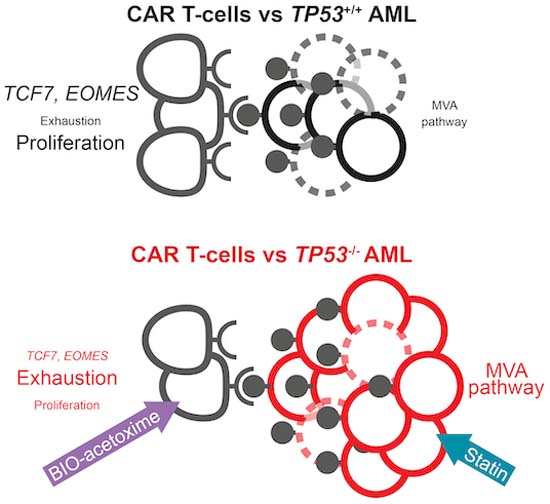Acute myeloid leukemia (AML) is an aggressive blood cancer caused by a plethora of genetic mutations acquired throughout one’s lifetime. One of these genes, the tumor suppressor gene TP53, plays a crucial role. Normally, TP53 helps prevent tumor formation. However, if this gene mutates in leukemia patients, their prognosis becomes very poor because their genes develop resistance to conventional chemotherapy drugs. Therefore, there is currently intensive research into new treatment methods such as CAR-T cell therapy. CAR-T cell therapy has already been successfully used for other blood cancers.
In a recent study, researchers from institutions including the University of Zurich and Zurich University Hospital in Switzerland discovered a specific mutation in cancer cells of an aggressive blood cancer that hinders the effectiveness of novel immunotherapies like CAR-T cell therapy. Their research also elucidated the reasons for cancer cells developing resistance and how to overcome this resistance: by simultaneously using drug therapy or genetically modified CAR-T cells. The related research findings were published in the EMBO Molecular Medicine journal on March 14, 2024, titled “Targeting the mevalonate or Wnt pathways to overcome CAR T-cell resistance in TP53-mutant AML cells.”
An international research group led by Professor Markus Manz and Professor Steffen Boettcher from the Department of Oncology and Hematology at the University of Zurich and Zurich University Hospital has now confirmed that AML cells carrying TP53 mutations exhibit significantly higher resistance to a novel immunotherapy, CAR-T cell therapy, compared to AML cells without this mutation.
Boettcher stated, “The reason for the poor effectiveness of CAR-T cells with mutated TP53 genes is that these immune cells exhaust more quickly, thus exhibiting lower activity against cancer cells.”
In CAR-T cell therapy, specific immune cells called T cells are extracted from the patient’s blood. These immune cells are then genetically modified in the laboratory to form numerous new contact points on their surface, known as chimeric antigen receptors (CARs). Once reintroduced into the patient’s body, these CAR-T cells can recognize certain surface structures of tumor cells, enabling them to identify and selectively eliminate cancer cells. Currently, various CAR cell products are undergoing early clinical trials for testing against AML.
In this new study, the authors not only explored the mechanisms by which AML cells with mutated TP53 genes develop resistance to CAR-T cell immunotherapy but also discovered how to enhance the endurance of CAR-T cells and exploit the weaknesses of AML cells with mutated TP53 genes to overcome this resistance.
Through additional drug-assisted therapy or further genetic improvements to CAR-T cells, they were able to significantly enhance the efficacy of CAR-T cells against AML cells with mutated TP53 genes, to the point where there was no longer any treatment difference compared to AML cells without TP53 gene mutations.
Manz said, “This proof-of-concept study suggests that the simultaneous use of drug therapy and genetically modified CAR-T cells is an effective strategy for developing more effective and tolerable immunotherapies for AML patients with mutated TP53 genes.”
What We Do
As the leading cell therapeutics biotech that provides CAR-T cell therapy related services, Creative Biolabs masters the most advanced technology and has a very rich extensive experience and thus, can offer the best CAR products and CAR design & construction services.Our anti-TP53 products ranging from TCR vectors, TCR viral particles, TriCAR cectors, to TCR-like CAR products.
Reference
1. Mueller, Jan, et al. “Targeting the mevalonate or Wnt pathways to overcome CAR T-cell resistance in TP53-mutant AML cells.” EMBO Molecular Medicine (2024): 1-30.

